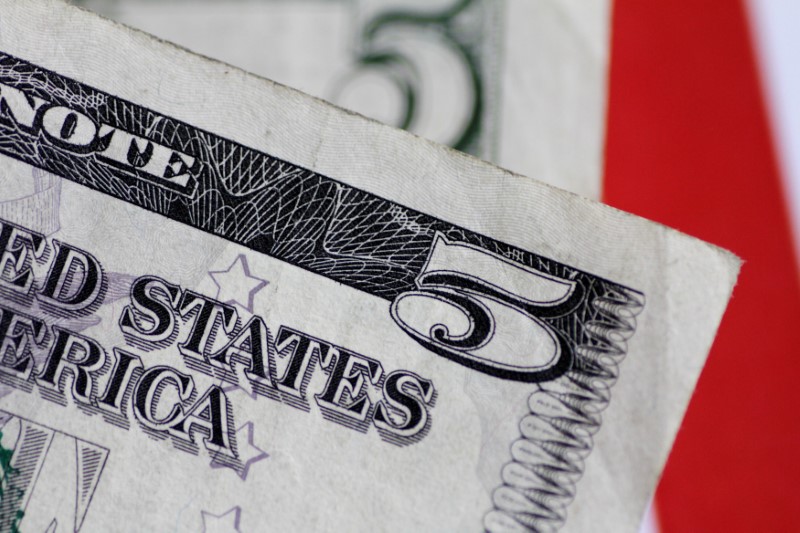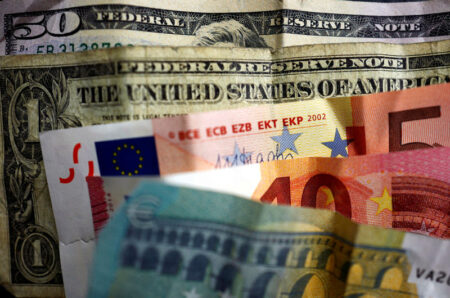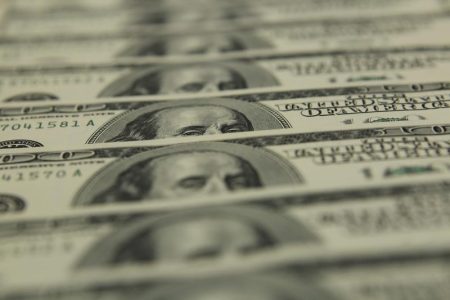By Herbert Lash and Harry Robertson
NEW YORK/LONDON (Reuters) -The dollar climbed to its highest in almost three months against nine other major currencies on Monday as traders slashed bets the Federal Reserve would aggressively cut interest rates this year after new economic data further diminished those odds.
U.S. services sector growth picked up in January as new orders increased and employment rebounded, the Institute for Supply Management (ISM) said, suggesting economic growth momentum from the fourth quarter spilled over into the new year.
ISM’s non-manufacturing PMI increased to 53.4 from 50.5 in December, higher than 52.0 that economists polled by Reuters had forecast. A reading above 50 indicates growth in the services industry, which drives more than two-thirds of the economy.
The data added to Friday’s blockbuster U.S. jobs report that far exceeded expectations and forced the market to readjust its outlook for rate cuts, the dollar’s strength and how high Treasury yields, which act to bolster the U.S. currency, can go.
“The question is, who can keep up with the U.S. in terms of the rates adjustment?” said Steven Englander, head of global G10 FX research and North America macro strategy at Standard Chartered (OTC:) Bank in New York. “The market’s answer so far is not too many central banks and not too many of their currencies.”
Treasury yields started to rise early on Monday after Fed Chair Jerome Powell said over the weekend that the U.S. central bank could “give it some time” before cutting rates. Yields rose further on news of the ISM survey.
The dollar rose against all members of the G10 grouping of currencies that are among the most liquid in the world.
The , which tracks the greenback against six other major currencies, jumped to 104.60, its highest since Nov. 14, and was last up 0.36% at 104.40.
The two-year Treasury yield was last up 9.4 basis points at 4.4638%, after jumping 18 bps on Friday.
The euro fell to its lowest since Nov. 14 at $1.0721 and was last down 0.43% at $1.0744.
In an interview with the CBS News show “60 Minutes” that aired on Sunday but was conducted a day before the jobs report on Thursday, Powell said the Fed could be patient in deciding when to cut its benchmark interest rate.
“The prudent thing to do is … to just give it some time and see that the data confirm that inflation is moving down to 2% in a sustainable way,” Powell said.
Japan’s yen fell to its lowest since Nov. 27 at 148.89 per dollar, and was last at 148.68.
Jane Foley, head of FX strategy at Rabobank, said a weak euro zone economy was also likely weighing on the euro.
“We have stagnation in Germany,” Foley said. “I think we’re going into a period when it’s going to be really hard for the euro to make significant gains.”
Data on Monday showed that German exports fell more than expected in December due to weak global demand.
RATE CUT EXPECTATIONS
Fed funds futures now show roughly 115 basis points (bps) worth of easing priced in for the Fed this year, down from about 150 bps at the end of last year.
A March cut is now seen as a 14.5% possibility, down sharply from 46.2% a week ago, according to CME Group (NASDAQ:)’ FedWatch Tool.
Sterling was down 0.75% to $1.2537, its lowest since Dec. 13, as the dollar rallied.
The pound showed little reaction to revised data that indicated Britain’s unemployment rate was lower than expected at the end of the year.
slid about 1.4% to 42,355.70 in late trading.
Read the full article here








